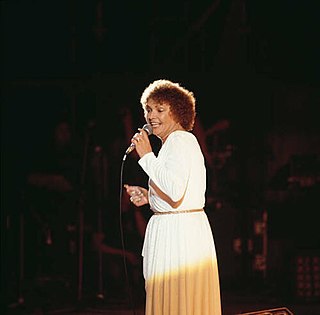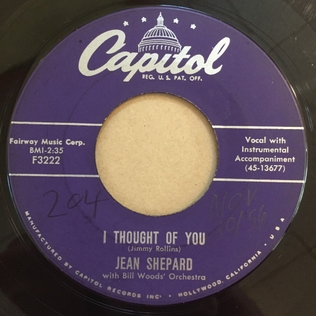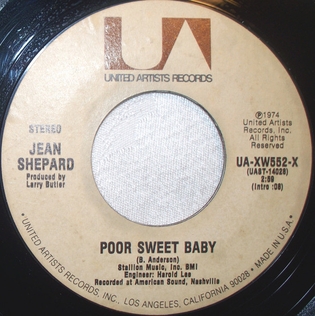
Billie Jo Spears was an American country music singer. She was known for a series of singles whose characters often represented women in assertive positions. Among these recordings was a song about sexual harassment, and a song about rekindling sexual desire ".

Jean Shepard was an American country singer who was considered by many writers and authors to be one of the genre's first significant female artists. Her early successes during the 1950s decade were said to influence the future careers of Loretta Lynn, Dolly Parton and Tammy Wynette.

The discography of American country singer Jean Shepard contains 29 studio albums, 12 compilation albums, two live albums, 1 box set album, 72 lead and collaborative singles, four promotional singles, two other charted songs and nine album appearances. Her first singles were released by Capitol Records in 1953, beginning with "Crying Steel Guitar Waltz". Her next two releases featured vocals by Shepard and a recitation by Ferlin Husky. The first was "A Dear John Letter", Shepard's only number one single on the US Hot Country Songs chart. It also reached number four on the US pop chart and number three in Australia. The second was "Forgive Me, John", which reached the US country top five, the US pop top 30 and the Australia top 20. In 1955, her solo singles "A Satisfied Mind" and "Beautiful Lies" both reached number four on the US Hot Country Songs chart. Their B-sides also charted on the US country chart: "Take Possession" and "I Thought of You". The latter peaked in the US country top ten.
"The Tip of My Fingers", also titled "The Tips of My Fingers", is a song written and originally recorded by American country music singer Bill Anderson. First included on his 1962 album Bill Anderson Sings Country Heart Songs, the song was a Top Ten country single for him in 1960.
"Rose Garden" is a song written in 1967 by American singer-songwriter Joe South. It was first recorded by Billy Joe Royal on his 1967 studio album Billy Joe Royal Featuring "Hush". Versions by South himself and Dobie Gray appeared shortly after the original. Gray's version became a minor hit in North America in 1969.

"I Want to Go Where No One Knows Me" is a song written by Kenneth Grant and Jerry Jericho. It was originally recorded by American country singer Jean Shepard. Released as a single in 1958, it reached the top 20 of the US country chart.

"I Thought of You" is a song composed by Jimmy Rollins that was recorded by American country singer Jean Shepard. Released as a single in 1955, it became a top ten song on the US country chart in 1955, becoming Shepard's fourth top ten recording in her career. It was given positive reviews by publications following its release.

"Second Fiddle (To an Old Guitar)" is a song written by Betty Amos that was originally recorded by American country singer Jean Shepard. It was released as a single by Capitol Records in 1964, reaching the top five of the US Country chart. The song featured Shepard yodeling and was her first top ten single in ten years. The song would later be nominated by the Grammy Awards.

"If Teardrops Were Silver" is a song written by Don Wayne that was originally recorded by American country singer Jean Shepard. It was released as a single by Capitol Records in 1966, reaching the US country top ten that year. It received positive responses from Cashbox and Record World magazines. It was included on her 1967 studio album of a Heart, We Did All That We Could.

"Then He Touched Me" is a song originally recorded by American country singer Jean Shepard. Written by George Richey and Norro Wilson, it reached the top ten of the US country chart and was nominated by the Grammy Awards. It was Shepard's ninth top ten single in her career and was included on her 1970 album A Woman's Hand.

"At the Time" is a song written by Bill Anderson that was recorded by American country singer Jean Shepard. Released as a single by United Artists Records, it reached the top 20 of the US country chart in 1974. It was the second single written by Anderson that Shepard recorded. It was given positive reviews from magazines and books following its release.

"Poor Sweet Baby" is a song written by American singer-songwriter Bill Anderson that was originally recorded by American country singer Jean Shepard. Released as a single by United Artists Records in 1974, it reached the top 20 of the US and Canadian country charts in early 1975. It would serve as the title track to Shepard's 1975 studio album Poor Sweet Baby...And Ten More Bill Anderson Songs.

When It's Time to Fall in Love Again is a studio album by American recording artist Wanda Jackson. It was released in 1974 via Myrrh Records and contained ten tracks. It was the first collection of country music recordings released following Jackson's departure from Capitol Records in 1973 and was her twenty-second album in her career. The project included two singles. The second single, "Come on Home ", made chart positions on the American country songs survey in 1974.

Best by Request is a studio album by American country singer Jean Shepard. It was released in March 1970 by Capitol Records and was her fifteenth studio album. The songs were re-recordings Shepard revisited, which were considered her best known songs such as "A Satisfied Mind" and "Beautiful Lies". Best by Request made the US country albums chart following its release and received a positive review from Cash Box magazine.
"Come on Phone" is a song originally recorded by American country singer Jean Shepard. Released as a single in 1973, it reached the top 40 of the US and Canadian country songs charts. It was the second single spawned from her 1973 album Slippin' Away. It received positive reviews from music magazines following its release.

Slippin' Away is a studio album by American country singer Jean Shepard. It was released by United Artists Records in September 1973 and was her twentieth studio album. The album was named for Shepard's top five US and Canadian country single of the same name. The album itself was Shepard's first for United Artists after many years with Capitol Records. It received a positive response from both Billboard and Record World magazines.

Poor Sweet Baby...And Ten More Bill Anderson Songs is a studio album by American country singer Jean Shepard. It was released by United Artists Records in March 1975 and was her twenty-second studio album. The disc was a collection of songs that paid tribute to singer-songwriter Bill Anderson. It included some re-released Anderson-penned tracks that appeared on previous Jean Shepard albums, along with covers of songs Anderson had composed over the years. It received reviews from music publications following its release and made the US country albums chart.

"Another Neon Night" is a song written by Carolyn Sue Howard and Joanne Spain that was originally recorded by American country singer Jean Shepard. It was released as the second single from her studio album I'm a Believer, reaching country chart positions in both the US and Canada. Describing a one-night-stand, the song has been described as being one of Shepard's best tracks and one of her favorite recordings as well.

I'm a Believer is a studio album by American country singer Jean Shepard. It was released by United Artists Records in November 1975 and was her twenty third studio recording. The album was a collection of ten tracks that mixed new songs with cover material. Among its new selections were two singles: the title track and "Another Neon Night". Both made the US country chart in 1975. The album was give positive reviews from music publications following its release.

Mercy, Ain't Love Good is a studio album by American country singer Jean Shepard. It was released in August 1976 by United Artists Records and was her twenty fourth studio album. The project contained a total of ten tracks, including two singles for which the album's name was derived from: "Mercy" and "Ain't Love Good". Both reached the US country chart as did the album itself. The album was Shepard's final for the United Artists label.


















